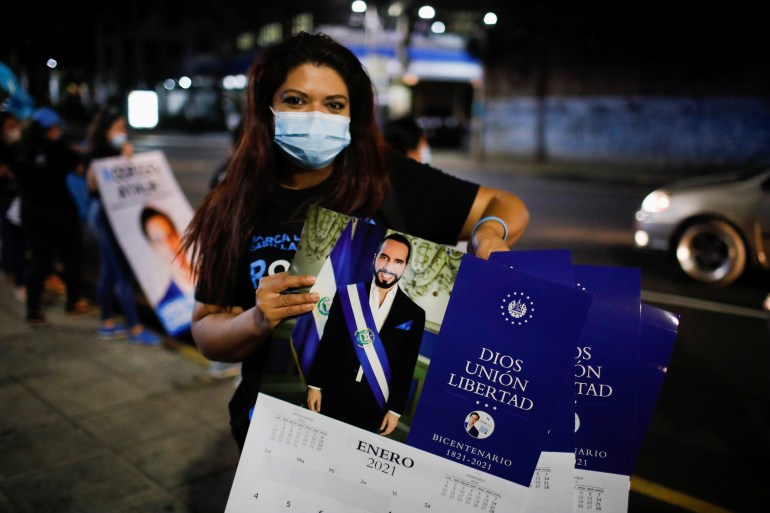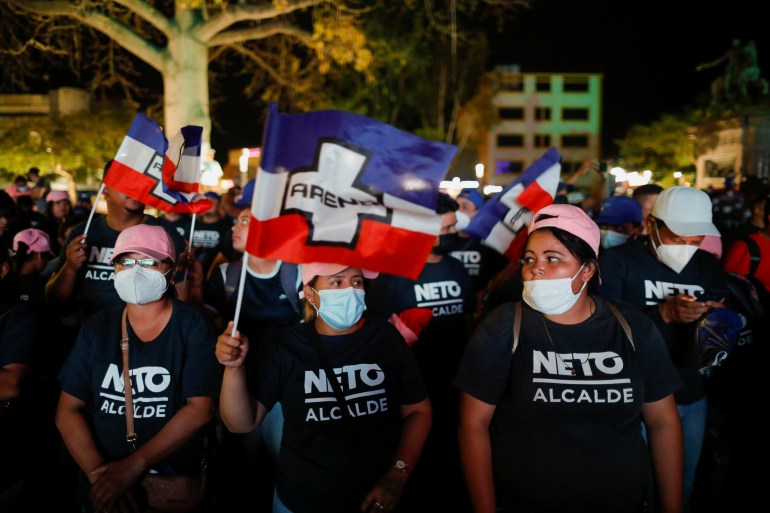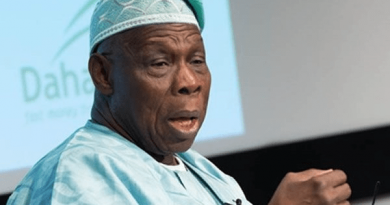El Salvador elections: President Bukele set to gain more control | Elections News
San Salvador, El Salvador – Salvadorans are heading to the polls on Sunday to elect the country’s 84-member National Assembly in a vote that civil society groups fear could destabilise the democratic order imposed by a 1992 peace accord that ended a 12-year civil war.
Voters will choose 84 legislators to represent them in the national assembly for the next three years, and polls show nearly 70 percent of voters favour president Nayib Bukele’s Nuevas Ideas party.
“I’m going to vote for [Nayib’s party] because he has helped us a lot,” said Wendy Henriquez, a 46-year-old street vendor who had never voted before casting a ballot for Bukele in the 2019 presidential elections.
She said she is supporting candidates from his party because she thinks the president is doing a good job, citing pandemic aid and a plan to give all public school students a computer as the government’s major accomplishments.
While supporters of the president’s party are energised, civil society groups have raised concerns the elections could speed up the deterioration of the country’s democratic institutions that they say began when Bukele took office.
“We haven’t seen such consistent authoritarian behaviour since the end of the peace accords,” said Luis Mario Rodriguez, director of Political Studies for the Salvadoran Foundation for the Social and Economic Development (FUSADES).
 A supporter of the Nuevas Ideas political party holds calendars with the picture of El Salvador’s President Nayib Bukele during a rally in San Salvador on February 24 [Jose Cabezas/Reuters]
A supporter of the Nuevas Ideas political party holds calendars with the picture of El Salvador’s President Nayib Bukele during a rally in San Salvador on February 24 [Jose Cabezas/Reuters]Post-war order
Two main political parties – right-wing ARENA and left-wing FMLN – have dominated Salvadoran politics since the signing of the peace accords.
But their support has waned in recent years after a series of high-profile corruption scandals, leaving an opening for a populist candidate to win over disgruntled voters with promises of change.
In 2019, Bukele became the first candidate from outside these two parties to win the presidency in the post-war period and he has repeatedly downplayed the importance of the peace accords. The 39-year-old social media savvy leader campaigned on an anti-corruption platform and promised to rid the political system of an old order that pillaged public funds.
Rather than focus on proposals of individual candidates, Bukele has focused on convincing voters to turn out for his party so that he will have enough seats to pass legislation without opposition from traditional parties, who he claims are corrupt.
Nuevas Ideas candidates have promised to bring a new approach to security, education and unemployment, but many are not new faces in Salvadoran politics, and held public office as members of another party.
Polls show no other party – of the two traditional ones and six others – will gain much more than 5 percent of the vote. Polls open at 7am local time (13:00 GMT) at nearly 1,600 voting centres around the country, and officials expect preliminary results a few hours after polls close at 5pm (23:00 GMT).
Even though Bukele is not up for re-election, which is prohibited by the Salvadoran constitution, he has been campaigning for his party in the hopes of winning a majority or supermajority of legislators until his term ends in 2025.
Since the peace accords, no party has won a simple majority of 43 seats in the assembly without forming a coalition with legislators from other smaller parties.
Authoritarian slide?
Since taking office in June 2019, human rights groups in El Salvador have warned of Bukele’s increasingly authoritarian governing style. They are particularly worried about his use of the armed forces, which played a troubling role in El Salvador’s past and carried out massacres against unarmed civilians during the civil war.
On February 9, 2020, Bukele entered the national assembly with the armed forces to pressure legislators to pass a loan to support his security plan.
Bukele has rejected and mocked criticisms about his governing style, saying he would have taken even more extreme action like shooting his opponents if he truly were a dictator. He and his supporters have used the hashtag #QueBonitaDictadura (What a Beautiful Dictatorship) on social media to highlight public work projects and other government initiatives.
 Supporters of the ARENA party take part in a rally during the last day of the election campaign in San Salvador on February 24 [Jose Cabezas/Reuters]
Supporters of the ARENA party take part in a rally during the last day of the election campaign in San Salvador on February 24 [Jose Cabezas/Reuters]When more than 40 civil society groups approached candidates from all parties to sign a letter committing to respecting democratic norms, no candidate for Nuevas Ideas signed on.
Many human rights groups and political analysts considered the February 2020 episode a dress rehearsal for what is to come.
“Voters think that if Bukele behaves badly, they will correct it with the next election, but it’s possible that there won’t be another election with the same rules of the game as clear as they have been since the peace accords,” said Salvadoran human rights defender Celia Medrano.
“The problem that is at stake on February 28 is that this frustration won’t matter if he manages to control everything because it will already be too late.”
Widespread support
Some voters say they want their vote to counteract this potential concentration of power.
“He wants to gain too much power. If they have all the power, they’re going to want to do whatever they want,” said Daniel Pinos, a 41-year-old street vendor who plans to vote for opposition candidates from new parties VAMOS and Nuestro Tiempo.
“If there are other parties, it’s more complicated. They’re not going to be able to do whatever they want.”
But most voters brush off critiques of Bukele and his authoritarian tendencies as political infighting or jealousy.
“Unfortunately, they (the traditional parties) haven’t done things the right way, and their stealing has come out all over – in the radio, TV, and newspapers,” said Nuevas Ideas voter Julio Munoz, a 56-year old vegetable seller.
“They want to talk bad about the president because it suits them because they’re going to lose and they’re not going to be governing. It’s all over for them.”
Nuevas Ideas supporter Roberto Antonio Linares, 52, said he does not want to see the government become a dictatorship because he remembers the harm these governments do to the people. But he does not believe Bukele is on that path.
“We’ll just have to see in the time that he governs if there is no corruption that affects the people,” Linares said.

